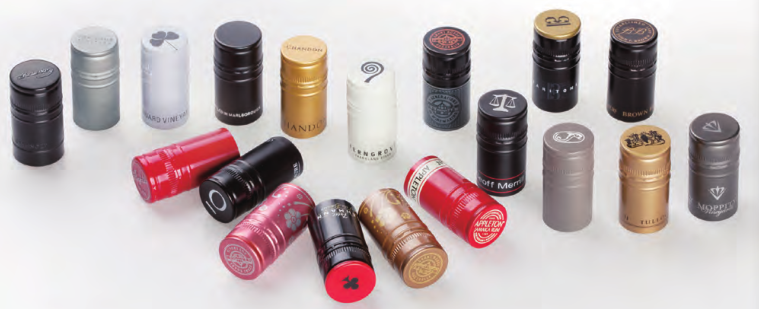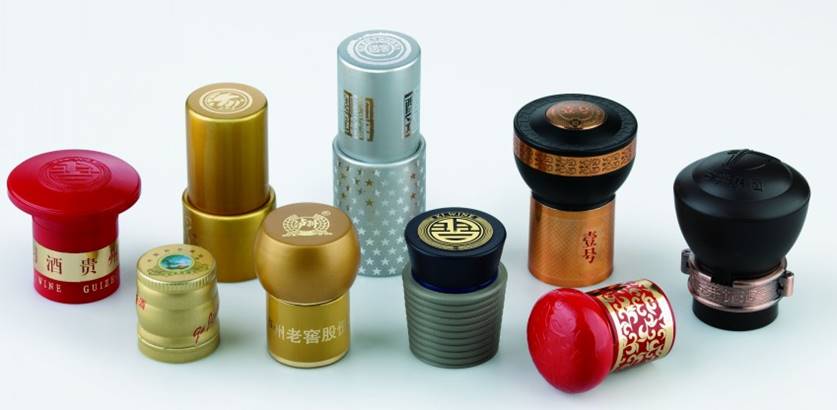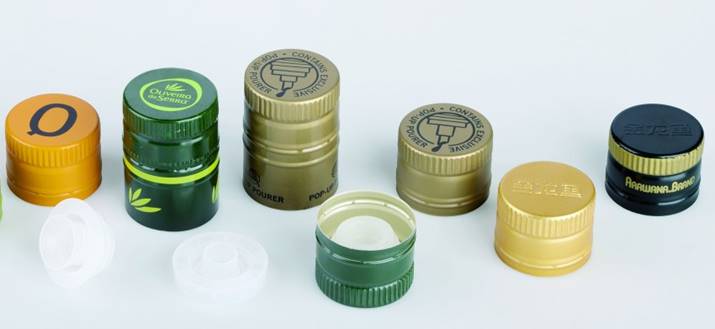With the exquisite techniques, innovative crafts and large scale production line, Hicap Closrues provides clients with high quality packaging closures and services,not only strengthening the pilfer proof function, but also make the whole packaging to be more premium.
Wine Screwcaps (30x60, 31.5x60, 30x44, 25x43, Tin Saran liner, Saranex liner)
Hicap Closures Wine screwcaps have been adopted by leading wine manufacturers in many coutries due to the benefits they offer with respect to traditional corks: they have no impact on the organoleptic qualities of the wine, avoiding oxidation and the so-called `cork taint`.
The wine lasts longer over time and its delicate balance does not change when transported.
Hicap Closures screwcaps make the bottle easier to open and to re-seal, maintaining the quality and the taste of the wine for longer. The screwcaps can be personalised with a variety of decoration techniques to meet the customer`s brand and marketing requirements.
Spirits Closures (33x57, 33x47, 31.5x44, 31.5x50, 28x38, 30x60, 28x18, 36x52 etc.)
Hicap Closures is the world leader in the production of non-refillable closures and in anti-counterfeiting technologies, with 10 billion closures sold each year.
Technological innovation has provided spirits manufacturers with packaging solutions that make the counterfeiting of packaging increasingly difficult, enabling them to protect their brand image.
Current solutions encompass an infinite number of non-refillable pourers with different levels of protection; non-refillable valve systems and tamper-evident systems.
We are able to design totally customised closures in an infinite range of colours, shapes, sizes and materials to meet the needs of customers and to enhance brand image.
Oil and Water Closures (31.5x24, 31.5x44 safety closures)
Hicap Closures provides a diversified range of caps, both short and long, with pourers that have been specifically designed for the viscosity of the oil, with a view to enabling perfect pouring, as well as anti-drip devices to avoid the drips that could form when pouring is interrupted.
Non Refillable Closures,Non Refillable Closures Bottle Caps,Snap On Closures,Twist Off Closures Yantai Hicap Closures Co., Ltd. , https://www.hicapclosure.com
It is said that basically 90% of the air pollution in the vehicle exceeds the standard. For consumers, it is more important to know where the toxic gas is produced than to control it.
I. Sources of pollutants The pollution of chemical substances in vehicles is mainly from asbestos, asphalt, and polystyrene.
Asbestos itself is not toxic. Its greatest harm comes from its fibers. This is a very small, barely visible fiber. Asbestos is usually used as a brake pad in automobiles. Dispersion of carcinogenic fibers in asbestos is mainly released into the air during production or during high-temperature friction. The reason why developed countries can't use them anywhere is to eliminate the asbestos contamination that occurs during the production and manufacture of asbestos.
Asphalt, due to sun exposure and engine heat, the bitumen that clings to the steel plate in the car is easily decomposed and released to release harmful substances due to heat. And this process will last for many years. Many international brand-name cars are used to reduce costs when they are jointly producing in China. In most automobile vehicles, asphalt-based damping materials are commonly used.
Polystyrene is a raw material for thermoplastics. Similar materials include polyvinyl chloride and polyamide (also called nylon). This material is widely used in automobiles (such as seat adjustment hand wheels, etc.) and emits benzene, formaldehyde, etc. Toxic Chemicals.
Microorganisms, bacteria, etc. are most likely to grow in the rubber and seats inside the vehicle. When the ground glue is close to the ground in the vehicle, the air circulation at the bottom cannot be guaranteed. In the long term, it will breed a large amount of bacteria; similarly, people Bacteria from the outside world will also attach directly to the seat.
Second, what are the hazards of car gas?
The harm caused by toxic gases released from chemical components in the vehicle is the most common one that affects the human nervous system. In severe cases, it may cause headaches. High concentrations of benzene have anesthetic effects on the central nervous system, causing acute poisoning; long-term exposure to benzene damages the hematopoietic system and causes chronic poisoning. Prolonged exposure to formaldehyde can lead to low immunity and easy infection. In severe cases, it may cause cancer. Formaldehyde, asphalt, and asbestos fibers may produce carcinogenic substances. Some volatile organic compounds can also cause immunological disorders. Long-term exposure can cause damage to liver function and hematopoietic system.
Third, how to prevent car poison gas?
People often don’t pay enough attention to the pollution in the car. When the problem is discovered, it may have caused great harm to the body. In addition, if some accessories containing activated carbon can be used, it can also improve the air in the car to some extent. Quality, protection of health. All the countermeasures are not as good as before the problem occurs. Here, we suggest that we raise awareness of environmental protection, start from the details, and try to select some low-carbon and environmentally friendly materials when replacing parts. For the sake of oneself, the family and children around them will be eliminated in the bud. 

